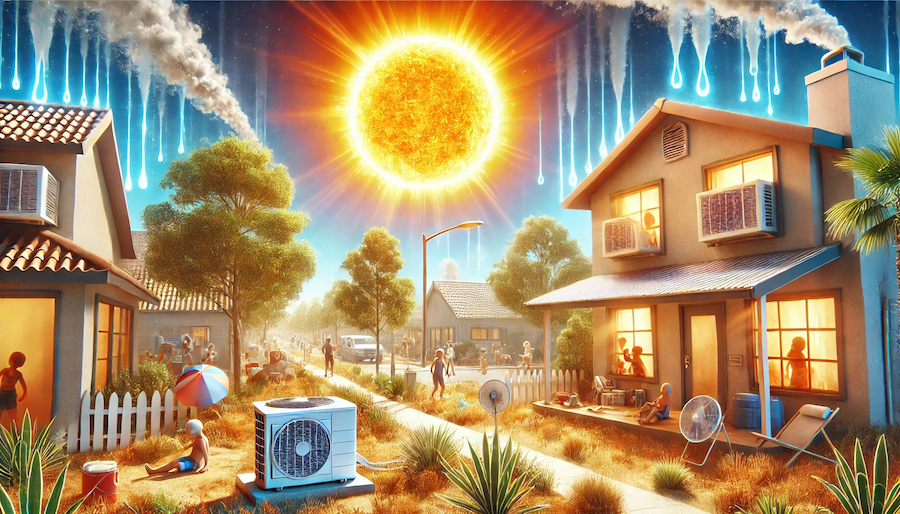Introduction To HVAC Tips
With the increasing frequency and intensity of heatwaves, homeowners are often faced with the daunting task of keeping their homes cool and comfortable. This challenge is even more pronounced for those with older HVAC systems, which may not be as efficient or reliable as newer models. However, with the right maintenance and strategic measures, it is possible to enhance the performance of your older HVAC system and maintain a comfortable indoor environment during extreme heat.
Understanding Your HVAC System
To effectively manage your HVAC system during a heatwave, it’s essential to understand its components and potential weaknesses. An older HVAC system typically includes an air conditioner, furnace, ductwork, and a thermostat. Over time, these components can wear down, leading to reduced efficiency and increased energy consumption. Common issues faced by aging systems include refrigerant leaks, worn-out compressors, and inefficient air distribution due to clogged or leaking ductwork.

Pre-Heatwave Maintenance
The key to surviving a heatwave with an older HVAC system is thorough pre-heatwave maintenance. Regular checks and minor repairs can significantly enhance the performance and reliability of your system.
- Check and Replace Filters: Dirty or clogged filters can restrict airflow, forcing your HVAC system to work harder. Ensure you check your filters regularly and replace them as needed, ideally every 1-3 months.
- Inspect Ductwork: Leaky or poorly insulated ductwork can result in significant energy loss. Inspect your ducts for any visible leaks and seal them using duct tape or mastic sealant. Additionally, ensure your ductwork is properly insulated to prevent cool air from escaping.
- Thermostat Functionality: Verify that your thermostat is working correctly. Consider upgrading to a programmable thermostat, which can optimize cooling schedules and reduce energy consumption.
Enhancing HVAC Efficiency
Improving the efficiency of your HVAC system can make a substantial difference during a heatwave. Here are some tips to enhance performance:
- Install a Programmable Thermostat: A programmable thermostat allows you to set specific temperatures for different times of the day, ensuring your system runs efficiently without unnecessary energy use.
- Seal Windows and Doors: Prevent cool air from escaping by sealing gaps around windows and doors. Use weatherstripping or caulk to close any gaps and keep your home airtight.
- Use Ceiling Fans: Ceiling fans can help circulate cool air, making your home feel more comfortable without over-relying on your HVAC system. Ensure fans rotate counterclockwise during the summer to push cool air downward.
- Keep Blinds and Curtains Closed: Sunlight streaming through windows can significantly increase indoor temperatures. Keep blinds and curtains closed during peak heat hours to reduce heat gain.
Emergency Measures During a Heatwave
Despite your best efforts, there might be instances when your HVAC system fails during a heatwave. Here are some emergency measures to stay cool:
- Portable Fans and Air Conditioners: Use portable fans and air conditioners to provide temporary relief. Position fans near windows to draw in cooler evening air.
- Stay Hydrated and Use Cooling Pads: Drink plenty of water to stay hydrated and use cooling pads or wet towels to lower your body temperature.
- Seek Professional Help: If your HVAC system fails, contact a professional HVAC technician promptly to diagnose and repair the issue. Do not attempt complex repairs on your own, as this can lead to further damage.
Long-Term Solutions for Older Systems
While maintaining and optimizing your older HVAC system can provide short-term relief, considering long-term solutions is also essential.
- HVAC Upgrade: Upgrading to a newer, more energy-efficient HVAC system can provide significant benefits. Modern systems are designed to be more efficient, reducing energy consumption and lowering utility bills. Although the initial investment can be substantial, the long-term savings and improved comfort are often worth it.
- Alternative Cooling Options: Explore alternative cooling options such as split systems, evaporative coolers, or ductless mini-splits. These systems can provide efficient cooling with potentially lower energy costs.
Surviving a heatwave with an older HVAC system requires a combination of regular maintenance, efficiency improvements, and emergency measures. By taking proactive steps to maintain your system and optimize its performance, you can ensure a comfortable indoor environment even during extreme heat. Remember to consider long-term solutions like system upgrades to enhance your home’s overall cooling efficiency.
Get a quote for professional HVAC services and further resources on maintaining and upgrading your system. Stay cool and comfortable all summer long with expert tips and solutions tailored to your needs.
